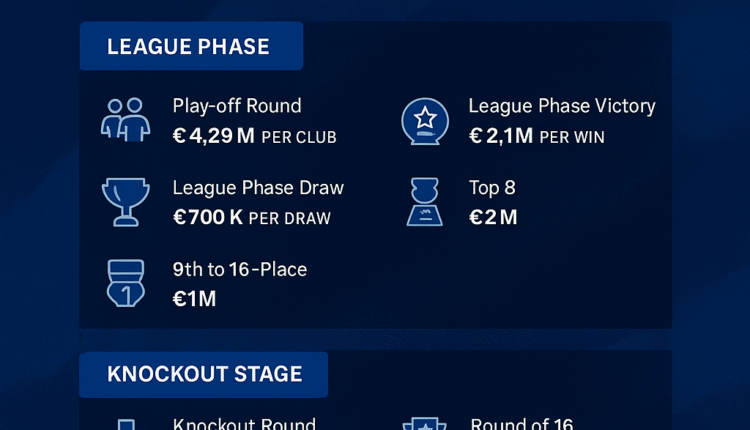The Ultimate Guide to Champions League Prize Money (2024–25)
The UEFA Champions League is not only Europe’s premier club football competition but also a significant financial venture for participating clubs. The Champions League prize money structure plays a pivotal role in shaping club finances, influencing transfer strategies, and determining competitive balance across European football. In this guide, we delve into the intricacies of the 2024–25 prize money distribution, providing insights into how clubs benefit financially from their performances.
Champions League Prize Money Breakdown for 2024–25
UEFA has allocated a substantial financial pool for the 2024–25 Champions League season, with a total distribution of €2.467 billion among participating clubs. This amount is divided based on performance, market pool shares, and historical coefficients.
Base Payments and Performance Bonuses
-
Play-off Round: €4.29 million per club
-
Base Fee for League Phase Participation: €18.62 million per club
-
League Phase Victory: €2.1 million per win
-
League Phase Draw: €700,000 per draw
-
Top 8 League Phase Bonus: €2 million
-
9th to 16th Place Bonus: €1 million
Knockout Stage Rewards
-
Knockout Round Play-offs: €1 million
-
Round of 16: €11 million
-
Quarter-finals: €12.5 million
-
Semi-finals: €15 million
-
Runner-up: €18.5 million
-
Champion: €25 million
Additional Financial Incentives
Market Pool Distribution
A portion of the prize money is allocated based on the proportional value of the television market in each country. This “market pool” rewards clubs from countries with higher broadcasting revenues, influencing the total earnings beyond on-pitch performance.
Historical Coefficient Rankings
UEFA also distributes funds based on a ten-year performance coefficient, rewarding clubs with consistent historical success in European competitions. This system ensures that clubs with a rich European pedigree receive financial recognition.
Financial Impact on Clubs
The Champions League prize money significantly affects club finances:
-
Revenue Generation: Deep runs in the tournament can substantially boost a club’s annual revenue.
-
Transfer Market Activity: Increased funds allow for more aggressive player acquisitions.
-
Wage Structures: Higher earnings can lead to improved player contracts and retention.
-
Infrastructure Development: Clubs may invest in stadium upgrades and training facilities.
FAQs About Champions League Prize Money
Q1: How is the Champions League prize money distributed?
A1: It’s divided based on participation, match results, progression stages, market pool shares, and historical coefficients.
Q2: Do all participating clubs receive the same base amount?
A2: Yes, each club receives a base fee for league phase participation, but total earnings vary based on performance and other factors.
Q3: How does the market pool affect earnings?
A3: Clubs from countries with larger TV markets receive a higher share of the market pool, increasing their total earnings.
Q4: Can a club’s historical performance influence current earnings?
A4: Yes, UEFA’s coefficient ranking rewards clubs with consistent historical success in European competitions.
Q5: What is the maximum a club can earn in a season?
A5: While it varies, a club winning all matches and the final can earn upwards of €100 million, including all bonuses and shares.
Quick Wiki Data Table: Champions League Prize Money 2024–25
| Stage | Prize Money (€) |
|---|---|
| Play-off Round | 4.29 million |
| League Phase Participation | 18.62 million |
| League Phase Win | 2.1 million |
| League Phase Draw | 700,000 |
| Top 8 Bonus | 2 million |
| 9th–16th Place Bonus | 1 million |
| Knockout Round Play-offs | 1 million |
| Round of 16 | 11 million |
| Quarter-finals | 12.5 million |
| Semi-finals | 15 million |
| Runner-up | 18.5 million |
| Champion | 25 million |
For more detailed information, visit the UEFA Champions League Wikipedia page.
Conclusion: Why Champions League Prize Money Matters
The UEFA Champions League prize money isn’t just a lucrative bonus — it is a vital revenue stream that defines the modern football economy. The tournament’s financial rewards incentivize performance, enable long-term planning, and fuel the ambitions of clubs at all levels. From underdog stories to dominant dynasties, the distribution of prize money often determines who competes, who thrives, and who simply survives in elite European football.
For fans, stakeholders, and analysts alike, understanding the Champions League prize money structure offers deeper insights into how the beautiful game is funded, how competitive balance is shaped, and how clubs prioritize their season objectives. As UEFA continues to evolve the format and financial model, staying informed is more essential than ever.
At FulltimePrediction.com, we strive to bring you the most detailed, expertly written, and search-optimized content in the world of sports. This guide ensures you are not just entertained by the Champions League, but empowered with knowledge behind the billions that drive it.


Comments are closed.